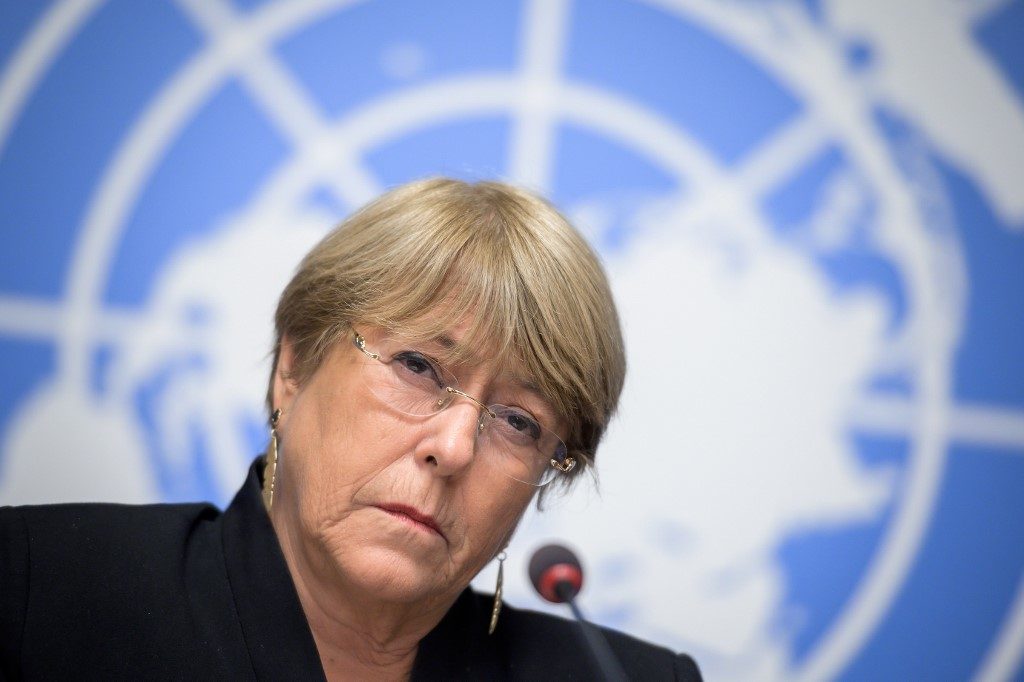SUMMARY
This is AI generated summarization, which may have errors. For context, always refer to the full article.

GENEVA, Switzerland – The UN human rights chief on Monday, September 9, slammed continued serious violations in Venezuela, including extrajudicial executions and torture, and voiced concern over moves to criminalize some domestic rights groups.
Speaking before the UN Human Rights Council in Geneva, Michelle Bachelet detailed a range of ongoing abuses in Venezuela and once again pointed a finger at Venezuela’s police special forces (FAES).
In a damning report in July, she had called on Caracas to “dissolve” an organization suspected of carrying out numerous extrajudicial executions.
But on Monday she said her office had continued to document suspected extrajudicial killings by FAES, pointing out that the NGO Victim’s Monitor had identified 57 cases of presumed FAES executions in Caracas in July alone.
“My office has not received information regarding measures taken to implement the recommendation made in my report to dissolve the FAES and prevent extrajudicial executions,” Bachelet said.
“On the contrary, the FAES have received support from the highest level of government.”
In her update on the Venezuela situation, Bachelet also cited a range of other grave rights violations in the country, which is caught in an economic crisis and a political standoff between President Nicolas Maduro’s government and National Assembly leader Juan Guaido.
The oil-rich country suffers from hyperinflation and shortages of basic goods from food to medicine, a crisis that has forced some 3.6 million people to flee the country since 2016.
The UN rights chief reiterated her criticism of US sanctions targeting Venezuela, warning that they were exacerbating the suffering of an already vulnerable population.
Reducing democratic space?
She hailed some advances, after Venezuelan authorities recently released 83 people and provided access to visit a number of others.
She also welcomed that the government had agreed to set up a system for dealing with individual contested detention cases, adding that her office had already presented “27 priority cases which we hope will be resolved soon.”
But she warned that her office had continued to document suspected cases of torture and ill-treatment in detention.
“Conditions of detention do not meet minimum international standards and those detained do not have access to adequate medical attention,” she said.
“I call on the authorities to take action to correct these practices, to allow access to medical care, and investigate human rights violations.”
At the same time, Bachelet said authorities had recently taken steps to criminalize the activities of domestic human rights organizations that receive funds from abroad.
Last month, Maduro’s right-hand man Diosdado Cabello warned that a bill first proposed under the late Hugo Chavez could soon become law, to “severely sanction NGOs and people who receive imperialist money to conspire against our country.”
If the law passes and is applied, this “would further reduce the democratic space,” Bachelet warned.
Bachelet also voiced deep concern over indications that civil society organizations and their representatives that collaborated with her office in the preparation of her July report had been “victims of public denouncements and threats by senior officials.”
“Reprisals for having cooperated with the United Nations are unacceptable and I urge the authorities to take preventative measures,” she said. – Rappler.com
Add a comment
How does this make you feel?
There are no comments yet. Add your comment to start the conversation.